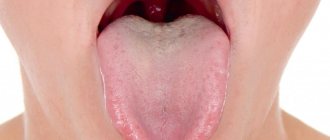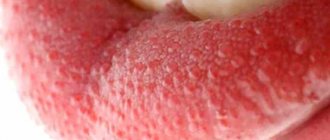How does uvulitis manifest?
Most often, swelling of the uvula develops suddenly, sometimes even for no apparent reason. You need to react as quickly as possible to prevent complications from developing. Indeed, sometimes the swelling spreads further and leads to asphyxia, that is, a condition when a person cannot breathe. You can tell that the uvula is swollen by the following signs:
- having problems swallowing solid or liquid food;
- a person experiences a sensation of a lump or foreign body in the throat;
- it becomes difficult for him to speak or pronounce individual sounds;
- possible feeling of sore throat;
- saliva production increases;
- false urge to vomit appears;
- and finally, the person begins to suffocate due to lack of air.
If the swelling is minor, the symptoms will be mild. And, conversely, as the disease progresses, it will become increasingly easier for a person to replace its manifestations.
The uvula interferes
People who are bothered by the uvula may experience snoring, a feeling of a lump in the throat, a feeling of discomfort, difficulty breathing, especially at night, and sometimes nausea due to pressure on the root of the tongue.
The appearance of this symptom is most often associated with either an anatomically low location of the soft palate or an enlargement of the uvula. A number of factors can lead to its occurrence. When snoring, the beating of the tongue against the walls of the pharynx causes mechanical damage, when smoking, tar has a negative chemical effect on its mucous membrane, and infections of the tonsils or allergic reactions lead to severe swelling. All these processes lead to chronic inflammation of the mucous membrane, and against this background, the muscles of the uvula are replaced by connective tissue and lose their tone. As a result, the uvula can no longer be pulled up and hangs down, sometimes even touching the root of the tongue.
Is the uvula getting in the way? Contact our Center and we will help you effectively! Sign up by phone.
Fortunately, the uvula has minimal impact on the lumen of the pharynx and does not make a significant contribution to the occurrence of sleep apnea. At the same time, its changes cause snoring, because the uvula is the most mobile part of the pharynx, which vibrates when air passes and produces a characteristic sound.
Patients with this problem are often recommended surgical treatment, for example, partial or complete removal of the tongue using the radio wave method. As a result, the vibration of the palate decreases and snoring disappears. This is possible if the uvula was the only cause of snoring, but we must remember that one person may have several factors that cause an unpleasant sound during sleep. This may be weight gain, a deviated nasal septum, polyps, adenoids and other changes in the walls and lumen of the pharynx. With this “set” there are often pauses in breathing during sleep - obstructive apnea syndrome.
In this case, soft palate surgery may not be the right choice. This is due to scarring of the walls of the pharynx and narrowing of the airway, which is unacceptable during apnea. It is much more effective to eliminate snoring in combination with apnea CPAP therapy, which prevents vibration and collapse of the pharyngeal walls, protecting your sleep and health at night.
Therefore, before removing the interfering tongue, you should consult a somnologist. If sleep apnea is present, the doctor will diagnose it, determine the severity of the disease, determine the causes and risk factors and, based on all this, recommend the optimal treatment regimen.
Assess yourself for signs of illness. These are shortness of breath at night, cough, sweating during sleep, severe daytime sleepiness, frequent urination, high blood pressure, decreased potency, and heartburn. You can also take an OSA test.
Patients with sleep apnea should begin treatment as quickly as possible. The disease is dangerous, it several times increases the risk of heart attack and stroke, accelerates the development of cardiovascular and other diseases, contributes to the appearance of endocrine disorders, and daytime sleepiness with OSA greatly increases the likelihood of injury or getting into an accident.
Is the uvula getting in the way? Contact our Center and we will help you effectively! Sign up by phone.
Most common reasons
There are many reasons why the uvula is swollen. Most often these are not serious illnesses or infections. However, other, rather dangerous options are also possible. Most often, swelling of the uvula is caused by:
- inflammatory diseases of the oropharynx, nasopharynx, mouth, nose or paranasal sinuses;
- injury or irritation;
- allergic reactions;
- burnt by alkalis, acids or other chemical compounds;
- taking certain medications;
- burnt by alcoholic drinks;
- the presence of a tumor in the nasopharynx;
- heredity.
Only a doctor can establish a reliable cause after a thorough examination and examination. Laboratory and instrumental studies help make the correct diagnosis.
Inflammation as a cause of swelling
In most cases, the uvula in the throat is sore and swollen due to inflammation caused by viruses or bacteria. The infectious process develops in the tonsils, nose or throat, then gradually spreads to the uvula, causing swelling and inflammation.
- Sore throat (or tonsillitis) - a streptococcal infection spreads quite quickly to the uvula due to its close location to the tonsils.
- Rhinitis (runny nose) - an infectious process descending into the nasopharynx, and from there to the soft palate.
- Laryngitis, pharyngitis, tracheitis, bronchitis or pneumonia - inflammation of the airways can also cause swelling.
- Caries, periodontitis or other dental diseases.
- Sinusitis, frontal sinusitis, ethmoiditis - bacteria that cause the development of infection easily spread to the mucous membrane of the pharynx and soft palate.
Treatment in this case should be aimed at combating the underlying disease. First of all, etiological therapy will be required to help get rid of the cause of the disease. If the inflammation was caused by bacteria, it is necessary to select the most suitable antibiotic. In case of viral infection, antiviral agents and immunomodulators are indicated.
Naturally, carious teeth must be treated immediately by a dentist. And inflammation of the paranasal sinuses requires an urgent visit to an ENT doctor and serious treatment.
What medications are used to treat an inflamed uvula?
When an inflamed tongue swells in the throat, the choice of medications is approached with great caution due to the high risk of complications of the respiratory system. All medicinal tactics are aimed at reducing swelling and relieving inflammation of the uvula.
Complex therapeutic tactics include the use of:
- antiallergic drugs - antihistamines (Lordestin) and glucocorticosteroids (Prednisolone, Triamcinolone);
- decongestant diuretics – Torasemide SZ, Hypothiazide, Furosemide. These medications are considered first aid and prevent the development of asphyxia.
- If the upper uvula is swollen after drinking alcohol, in order to stabilize the condition, Diazolin, Zyrtec or Aleron are prescribed and subsequent alcohol intake is completely avoided.
- When diagnosing a viral or bacterial infection that provoked inflammation of the uvula, antibiotics (Azithromycin, Amoxiclav) or antiviral drugs (Cycloferon, Remantadine, Arbidol) are prescribed.
Complex therapy also includes:
- treatment of the larynx with antiseptic sprays - Hexoral, Kameton;
- taking vitamin complexes (Vitrum, Multi-Tabs and immunomodulators (Immunity, Zdorov).
All medications are taken in a course, in accordance with the doctor’s prescription and under his supervision.
Treatment of respiratory system diseases
There is no doubt that influenza or pneumonia must be treated in a hospital setting. However, a common cold that causes the uvula to swell can be safely treated at home after a visit to the doctor. It is important to follow simple recommendations - and the disease will pass quite quickly.
Drinking regime
In case of ARVI, sore throat or other inflammation, you need to drink as much fluid as possible, because it removes toxic substances formed during metabolism. It is best to drink freshly squeezed juices, decoctions, and herbal teas. They help relieve intoxication and alleviate the patient's condition. Teas are best prepared from chamomile, mint, elecampane, and rose hips.
Vitamins to boost immunity
During illness, you need to eat more citrus fruits - they serve as a source of vitamin C. You should also include other vegetables and fruits in your diet. The vitamins and minerals contained in them will help strengthen the immune system.
It is best to drink tea with raspberries - among other things, they are a natural probiotic, which makes them good for the immune system. You shouldn’t give up kefir, cottage cheese, and yogurt. It is advisable to eat onions and garlic, because they are wonderful immunomodulators.
Injuries and minor damage
Ingestion of rough food, mechanical trauma or other causes can cause irritation and damage to the mucous membrane of the uvula. As a result, inflammation gradually develops in it. In the future, infection may occur. After all, microbes can easily penetrate through the damaged cover.
If the uvula is swollen for this reason, all negative factors that can lead to injury should be excluded. First of all, you need to give up crackers, very hot or cold foods - they are the most harmful in this condition.
Functions of the uvula: what is the essence of the problem?
The uvula is a distant process that is located in the mouth, on the edge of the soft part of the palate, slightly above the tongue, in a healthy state it is small in size and color, identical to the oral mucosa.
It performs important functions for the body:
- protects the nasopharynx from food entering during swallowing movements;
- separates air flows and warms them;
- is a barrier to infection;
- prevents accidental regurgitation of food;
- provokes a throat spasm, preventing a person from choking;
- participates in the formation of some sounds;
- if necessary, provokes vomiting.
When listing the functions of the uvula, it becomes clear why you need to monitor its condition. Inflammation of this organ leads to a failure in the coordinated functioning of the swallowing, respiratory, protective, resonator, and speech systems and makes the entire body vulnerable.
Allergic diseases
If the uvula is swollen for no apparent reason and there are no signs of inflammation, such as fever, wet cough or runny nose, the cause is most likely an allergy. An allergic reaction can be caused by foods with high sensitizing activity (citrus fruits, honey, nuts, eggs), household allergens or certain medications.
Angioedema, a disease characterized by asymmetric swelling of any part of the body, may also be the cause. The most dangerous lesion is the larynx. Most often, angioedema is caused by the following factors:
- insect bites, such as bees;
- pollen of some plants;
- household allergens;
- mites living in house dust;
- chocolate, eggs or other food products;
- medications;
- alcoholic drinks;
- hypothermia or prolonged exposure to the sun.
If the uvula is swollen for one of these reasons, the necessary measures should be taken immediately. It is necessary to eliminate the effect of the provoking factor as quickly as possible. For example, you need to move away from a flowering plant. If it is a food allergy, you need to rinse your stomach immediately.
You should go to the hospital as soon as possible, because laryngeal edema may develop. In this case, the person may die from asphyxia. A sick person can also take a hyposensitizing drug (Tavegil, Suprastin, Loratadine, Claritin or others). Perhaps these remedies will help completely relieve swelling. However, you need to see a doctor in any case.
Chemical burn
It is very easy to understand that the uvula is swollen due to a chemical burn. This is supported by the consumption of alcohol, any new, unfamiliar drinks or unusual food the day before. In this case, the tongue becomes red, it hurts, there is a burning sensation and discomfort in the throat. It is very difficult to swallow any food.
In this case, it is best to consult a doctor - he will prescribe treatment or the necessary antidote. Usually, if the burn is caused by acid, the mucous membrane is washed with an alkaline solution. And, conversely, the best antidote for an alkali burn is acid.
Why the tongue in the throat swells: reasons
If upon examination the soft palate is clean and the uvula is inflamed, the doctor will diagnose uvulitis. Most often, this disease has an acute form, which is characterized by suddenness - pain and swelling appear while eating or even at night during sleep. Reasons include:
- inflammatory pathologies - ENT infections, tonsillitis, advanced dental diseases, abscesses, diphtheria, tuberculosis, sexually transmitted diseases, HIV;
- chemical or thermal damage to the mucous membrane as a result of exposure of the tissue to aggressive compounds (burn with alkali or acid), as well as consumption of hot food and after alcohol;
- allergies – when including foods of an allergic nature in the diet, inhaling allergens (chemicals, natural irritants), taking medications;
- growths and formations in the pharynx - polyps, cysts. In addition to the immediate causes, there are associated factors that influence the enlargement of the tongue in the throat. This:
- a stuck bone in the throat that injures the mucous membrane;
- consumption of low-temperature drinks and foods;
- consequences of instrumental manipulations during examinations of the respiratory and gastrointestinal tract, as well as dental procedures;
A tumor of the uvula can appear after vomiting, especially prolonged and repeated attacks, from snoring and in those who smoke a lot. Source: nasmorkam.net










